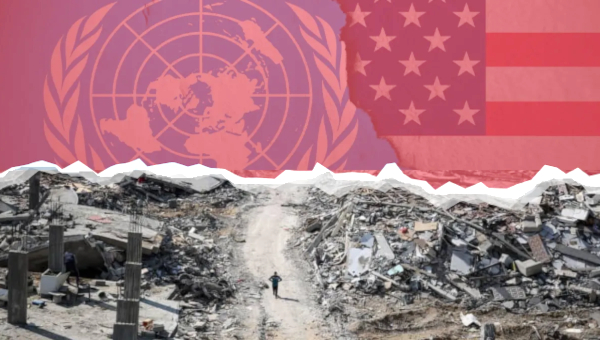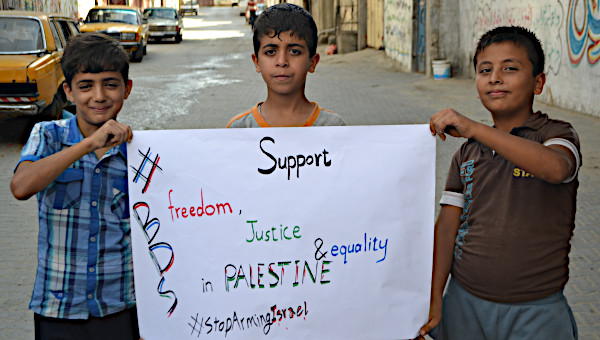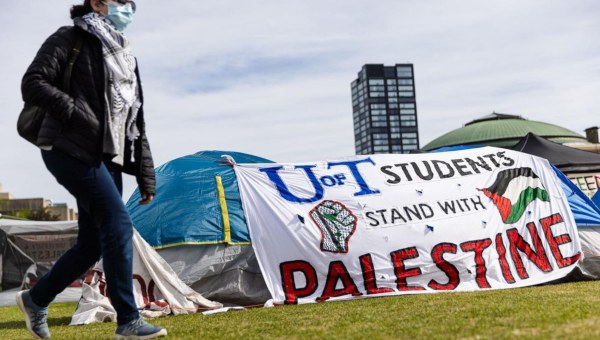Labour for Palestine: Can We Build the BDS Campaign?
Just less than a year ago in May 2006, the Canadian Union of Public Employees (CUPE) Ontario unanimously passed in convention its pathbreaking Resolution 50 in support for the global campaign against Israeli apartheid. The resolution called on the union to educate its members on the apartheid nature of the Israeli state. It also mandated that education be undertaken on Canadian political and economic support for these practices. CUPE Ontario would also participate in the international campaign of boycott, divestment and sanctions (BDS) against Israel until the realization of Palestinian self-determination and the right of return of Palestinian refugees.
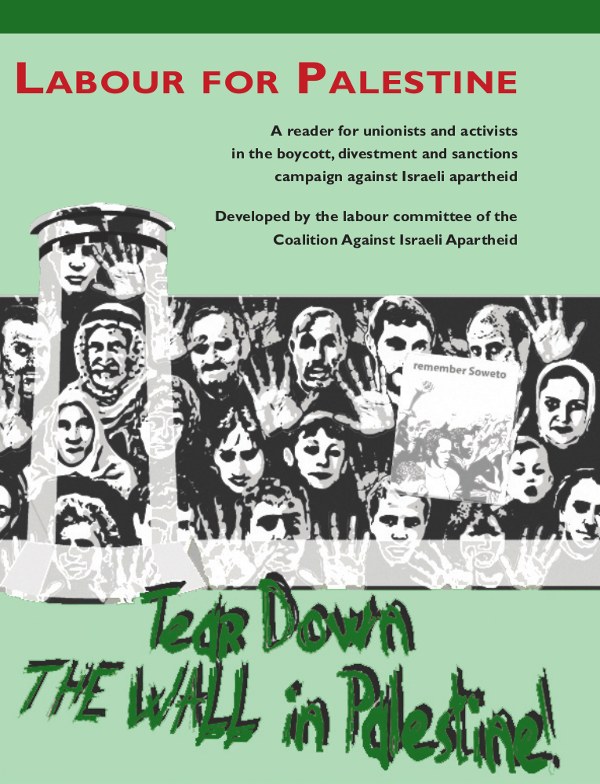 The Palestinian rights of self-determination, and the general economic condition of Palestinian workers, are important struggles for the North American labour movement. In this context, it is necessary to make an assessment where the union movement is at on Palestine, why that is the case, why it is important to struggle to change the labour movement’s position, and what are some things we can do inside the North American and Canadian labour movements to move the struggle ahead.
The Palestinian rights of self-determination, and the general economic condition of Palestinian workers, are important struggles for the North American labour movement. In this context, it is necessary to make an assessment where the union movement is at on Palestine, why that is the case, why it is important to struggle to change the labour movement’s position, and what are some things we can do inside the North American and Canadian labour movements to move the struggle ahead.
Unions and American Imperialism
First, we must recognize that while there are some positive positions taken on paper, such as some of the Canadian Labour Congress statements against the war in Afghanistan or in defence of Venezuelan democracy, there is no real engagement of the union movement today against American imperialism. Needless to say, on the issue of Palestine there are no solid formal positions, apart from the CUPE resolution, let alone participation in the movement.
The union movement in Canada has more or less staked out official positions that are critical of the role of the United States: the continuous efforts to sponsor trade liberalization and neoliberalism; the unilateral push to use military force to push forward that agenda and the continuous efforts for integration between the U.S. and Canadian ruling classes. There is no real effort to build a movement around any of these issues. Unions are missing, for example, from the anti-war movement: they might help fund activities of the peace movement, but union memberships are not there on the ground. There is neither regular union education nor conscious use of union resources to train and develop the corps of activists necessary to build a mass movement.
Compare these dog days of union mobilization to the time when they actively did build movements. Those who participated in the Days of Action general strikes in Ontario and the anti-globalization demonstrations across North America saw the massive participation of labour. This was the result of internal education and mobilization.
On the issue of Palestine, political education and mobilization of memberships are even worse. Many unions, particularly in Canada, give official support for Palestinian rights and most unions lined up to protest the massive attacks on Lebanese civilians in the Israeli aggression of last year. Most unions oppose the Israeli apartheid wall, and the continued Israeli occupation of Palestinian land. Most call for a negotiated peace that recognizes the national rights of Palestinians in some form. Many even call for an end to the boycott and support a continuation of aid to Palestinian institutions.
Except for the Canadian Auto Workers (CAW), there was mostly silence in response to CUPE-Ontario’s Resolution 50. CAW didn’t respond as a union, but its president, Buzz Hargrove, spoke out strongly against the resolution. The rest of the union’s leadership remained silent, and so has almost all of the Canadian union leadership (with positions in the U.S. union movement generally even worse).
There is deep reluctance among union leaderships to step outside the prevailing North American consensus to call Israeli oppression a system of apartheid. There is a refusal to challenge openly Israel as an aggressor state that continues to oppress the Palestinian people, and the role Israel plays as an arm of western imperialism in the Middle East. Union leaderships still too often want to appear to be “even handed” in the Israel-Palestine conflict. There is no effort to build or support a movement to pressure Israel to change.
The specificity of the union position on Palestine can be posed another way. In many areas of political struggle today, the union movement takes a very good position but fails to follow up the talk with political mobilization. But on Palestine, unions both talk and act in a way that is inconsistent with the principles of international solidarity.
Challenging Zionism in the Union Movement
The union movement responds this way partially through ignorance and concerns that challenging Zionist ideas and power reinforces anti-Semitism. It is partially rooted in the traditions of a kind of liberal and humanitarian internationalism that has, for years, characterized the Canadian trade union foreign policy establishment. There has long been a lack of a truly independent working class perspective of what Canada’s international policies could and should be. The Canadian union movement still tends to invoke a golden age of peacekeeping before the Bush ‘war on terror’ and the alliances with political elites on international ‘human rights’ issues. There is little in the way of an alternate vision of the world order outside of U.S. and Western hegemony. This would require challenging the relationship of Canadian ruling classes to the U.S., and their own interests in imperialist agendas, and the political projects of globalization and neoliberalism that has established the current world order and sought rollback union power.
The trade union leadership tends to avoid taking on the McCarthyism of the Zionist lobby in Canada. The actions of the lobby can be seen in the intimidation of the Ontario Secondary Schools Teachers Federation, both the general union leadership and specific activists, as solidarity activists tried to push forward resolutions on the Israel BDS campaign. The hegemony of the Zionist establishment over most of the institutions in the Jewish community – although there are some new organizations forming – scares many union leaders away. Some union people – among who are included a number of people who are leading key activist campaign – do not want to “turn off” those who might not understand the issues of Zionism (with its particular nationalism and project for the colonial settlement of Palestine) and Palestinian rights.
This failure inside the labour movement speaks more generally to the lack of a cross-union network of socialist activists struggling across a range of issues. Such a network is necessary to root the Palestinian struggle – along with other solidarity struggles – inside the heart and soul of the labour movement. This is what was crucial to the struggle against South African apartheid in the 1980s. The existence of even a small network in CUPE has made a difference to advancing the Israel BDS campaign there, but its limits are also evident in generalising the campaign even in CUPE nationally as well as to other unions.
Organized Labour and the Palestinian Struggle
The Palestinian struggle is not just another issue on the union agenda. The Middle East remains a central component of U.S. strategy, around oil, geopolitics and the push to lock-in global capitalism into regions of the world that remain nominally outside of Western power. Israel remains one of the principal vehicles for this strategy, partly directly through the instability and turmoil it sows across the Middle East. But Israel also plays a key role in, for example, pushing for invasion in Iraq, Afghanistan and Iran; relentlessly attacking secular nationalist and progressive movements in the Arab countries; expanding and locking in new settlers in the Occupied Territories; in a relentless campaign of assassination and jailing of Palestinian leadership; in support of U.S. foreign policies; and many others. The struggle for Palestinian national rights, therefore, is, at the present political moment, strategically central to weakening the power of neoliberal globalization more generally, and the ongoing integration of Canada and Canadian foreign policy within U.S. imperialism more specifically. The struggle is also a component of rebuilding union activist networks and political leadership back in the union movement.
This struggle is part of the wider need for secular, progressive and nationally consistent movements to remake, not only the boundaries, but also the dominant narrative of Middle East politics in North America. It would also take away the discursive and moral advantage of those who continue to use the card of terrorism, fundamentalism and religious sectarianism to win over working people. It is important to build a consciousness of this issue among working people. This is what happened when an earlier generation of activists built a movement against South African apartheid. It created a whole generation of dedicated anti-imperialists who went on to lead struggles against the 1991 Gulf War, the war in Iraq, the invasion of Afghanistan and other issues.
Why International Solidarity?
There are basic slogans which underpin the union movement: ‘an injury to one is an injury to all,’ or ‘no one class or nation can be truly free if it oppresses others.’ The working class was created as part of a capitalist system that even in its early years was an international and even a global system. Building international links between working people and oppressed peoples and nations has always been a strategic component of workers’ struggles for our own liberation and for defence of livelihoods and jobs.
It is easy to identify several such crucial solidarity linkages today: sweatshop workers in China; maquiladora workers in Mexico; illegal immigrants forced to work without protections in North America; unions struggling for workers’ control in Venezuela; and workers struggling for legalized independent unions in many parts of the world. Palestinian refugees and workers in the Occupied Territories confront some of the worst conditions in the world. Some have been living in refugee camps for almost an astonishing 60 years; there are vastly more people unemployed and on welfare than working in the Gaza. Palestinian workers are denied the right to work at decent wages and working conditions as a result of Israeli colonization and continued occupation.
In all these different places and conditions, workers in other countries are either going to be our allies in struggling against capitalism, or we will each be used to undermine each other. Collaboration with social injustices against working people and oppressed national communities strengthens our enemies. Supporting their struggles is just as important to us as building solidarity in our own workplaces and communities: they are about building our unions in Canada and North America. To argue that the only role of unions is to bargain for better wages and benefits for the workers organized in a specific local is the argument of the bosses. When co-workers say this, we need to educate them about realities, just as when a co-workers says that we don’t need unions at all.
Advancing the Palestinian Struggle
There are a number of ways that union activists in Canada and North America can advance the struggle of the Palestinian people and workers for national self-determination.
First, we need to build a network across unions on this issue. We need to root ourselves in a strong, principled and well-intellectually and politically-armed movement. That is being built now. This is the ground floor that we are beginning to build.
Second, we need to be able to identify and address principal concerns workers raise and some of the key positions to advance: anti-Semitism; terrorism; religious sectarianism; the role of Canadian and U.S. foreign policies; ties to our own interests; centrality in defeating globalization and neoliberalism; importance of international solidarity; and so forth. We are developing the educational materials and arguments for this now. In particular, we cannot avoid learning how to speak to Jewish workers and addressing their legitimate concerns about Israel and Palestine.
Third, we need to build internal networks, inside each of our unions. This is what we did during the South African anti-apartheid era. There were many key activists who finally understood internationalism through that struggle and learned about what imperialism really is. We have to reach these kinds of people again. It matters a lot: when activists in key local unions also work to explain this issue to co-workers, they can’t be rooted out.
Fourth, when anti-imperialist activists also get involved in local leadership positions in the union, they can earn a lot of respect for these ideas and add another dimension to education and building the union. Getting union locals to pass resolutions creates space to do more work.
Fifth, in order to do any of these, there needs to be a cross-union network of activists, around Palestinian solidarity but also beyond it. Each presupposes the other. There are a number of dimensions to building internal networks: forming a core of people in key places in different local unions and structures; working with them to provide materials and to start collectively organizing; building clear links between the union and people on the ground organizing in Palestine, as it is important for people to see that this campaign is tied to real people in struggle; provide speakers and public spokespeople so that the issue remains as a real reference point in the political universe; use electronic newsletters and other forms of communications that cannot be stopped from circulating and proliferate easily; and, finally, join in local Palestinian networks, such as Coalition Against Israeli Apartheid and its Labour for Palestine network in Toronto.
Developing union networks and campaigns against Israeli apartheid are big steps forward in the struggle. It signals that Israel as an apartheid state is gaining wider understanding. This can only reinforce the unbelievable endurance of the Palestinian people on the ground in Palestine and in refugee camps of the justice of their cause and their rights to national self-determination as any other people. The specific union challenge is to continue to deepen the confidence of workers to become active in the BDS campaign against Israeli apartheid. This cannot be apart – and is indeed one component – of rebuilding union networks in Canada and North America in the struggle for a different social order. •
New Book: LABOUR FOR PALESTINE
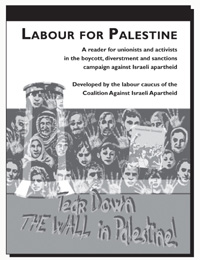
The Coalition Against Israeli Apartheid (CAIA) is proud to announce the publication of a new book, Labour for Palestine: A Reader for Unionists and Activists in the Boycott, Divestment and Sanctions Campaign Against Israeli Apartheid.
The 106-page book brings together important material exploring themes such as the history of the Palestinian struggle, Zionism and the Israeli labour movement, Canadian ties to Israeli apartheid, the global campaign of boycott, divestment and sanctions, and commentary around the CUPE Ontario resolution in support of BDS in May 2006.
The book is an invaluable resource for unionists and activists involved in Palestinian solidarity. For more information please see www.caiaweb.org or email endapartheid@riseup.net
Download a PDF (second edition, 2008).
Audio from the book launch:
- Introduction – Rafeef Ziadah:
- Adam Hanieh:
- Katherine Nastovski:
- Lynda Lemberg:
- Herman Rosenfeld:
Labour for Palestine Presents:
LIFT THE SIEGE! — PALESTINIAN WORKERS CALL FOR SOLIDARITY
Launching the New Book:
LABOUR FOR PALESTINE: A Reader for Unionists and Activists
Date: Sunday March 25
Place: Steel Workers Hall, 25 Cecil Street
Time: 2:00 – 5:00 pm
Last month, Palestinian trade unions issued an urgent call for international solidarity. Labour for Palestine, a group of cross-union rank and file activists active in the Coalition Against Israeli Apartheid, invites all concerned trade unionists to participate in a public meeting on the Canadian labour movement and solidarity with Palestine.


